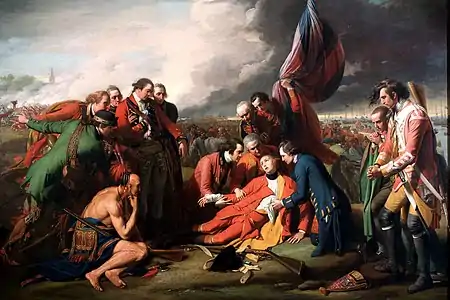| |||||
| Decades: |
| ||||
|---|---|---|---|---|---|
| See also: | |||||
| Part of a series on the |
| History of Canada |
|---|
 |
| Timeline (list) |
| Historically significant |
| Topics |
| By provinces and territories |
| Cities |
| Research |
Events from the year 1839 in Canada.
Incumbents
Federal government
Governors
- Governor of the Canadas: John Lambton, 1st Earl of Durham then Charles Poulett Thomson, 1st Baron Sydenham
- Governor of New Brunswick: John Harvey
- Governor of Nova Scotia: Colin Campbell
- Commodore-Governor of Newfoundland: Henry Prescott
- Governor of Prince Edward Island: Charles Douglass Smith
- Governor of Upper Canada: George Arthur then Charles Poulett Thomson
Events
- February 15 – Chevalier DeLorimier and others who joined in the Rebellion are executed.
- April 11 – Death of John Galt, novelist, one of the originators of the British American Land Company.
- June 24 – Last meeting of the Committee of Trade, forerunner of the Board of Trade.
- September 19 – Opening of the Albion Mines Railway in Nova Scotia, an early Canadian steam-driven mining railway[2]
- September 26 – Canadian rebels are transported to New South Wales.
- October 19 – Charles Thomson, Governor of Upper and Lower Canada, arrives. It is determined that Upper and Lower Canada shall share revenue in the ratio of 2 to 3.
Full date unknown
- Lord Durham's report recommends the establishment of responsible government and the union of Upper and Lower Canada to speed the assimilation of French-speaking Canadians.
- Territorial disputes between lumbermen from Maine and New Brunswick lead to armed conflict in the Aroostook River valley (the Aroostook War).
- First Horse Railway in Upper Canada.
- Mount Allison University founded by Charles Frederick Allison in Sackville, New Brunswick.
Births
- January 1 – Annie L. Jack, author
- January 29 – Élie Saint-Hilaire, educator, farmer and politician (died 1888)
- May 8 – Adolphe-Basile Routhier, judge, author and lyricist (died 1920)
- May 31 – Louis-Alphonse Boyer, politician (died 1916)
- October 8 – George Edwin King, jurist, politician and 2nd Premier of New Brunswick (died 1901)
- September 17 – Antonin Nantel, priest, teacher, school administrator, and author (died 1929)
- November 16 – Louis-Honoré Fréchette, poet, politician, playwright and short story writer (died 1908)
Full date unknown
- Augustus F. Goodridge, politician and Premier of Newfoundland (died 1920)
- James Colebrooke Patterson, politician, Minister and Lieutenant-Governor of Manitoba (died 1929)
Deaths
- September 18 – Jeanne-Charlotte Allamand, pioneer, educator and artist (b. 1760 in Switzerland)[3]
References
- ↑ "Queen Victoria | The Canadian Encyclopedia". www.thecanadianencyclopedia.ca. Retrieved 5 December 2022.
- ↑ Churcher website, Colin. "Significant Dates in Canadian Railway History". Archived from the original on 2006-08-29. Retrieved 2011-08-02.
- ↑ Halpenny, Francess G. (1988). Dictionary of Canadian Biography. Springer Science & Business Media. p. 13. ISBN 978-0-8020-3452-6.
This article is issued from Wikipedia. The text is licensed under Creative Commons - Attribution - Sharealike. Additional terms may apply for the media files.